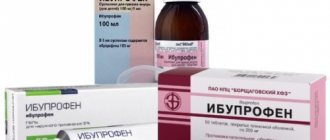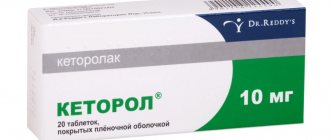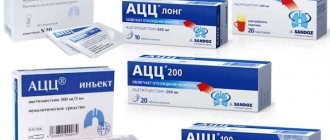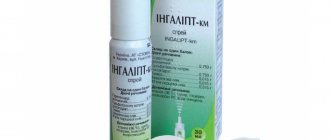Breastfeeding mothers, like everyone else, may need antibiotics to treat a bacterial infection. One common cause is infectious mastitis. In this case, you cannot do without the use of antibacterial drugs. The doctor prescribes them, choosing those that will not harm either the mother or the baby.
Expert opinion
Sokolova L. S.
Pediatrician of the highest category
Antibiotics prescribed by a doctor are generally safe during breastfeeding (BC) and do not require stopping feeding [1] [4].
When receiving a course of antibiotic therapy, a woman should know that some changes may occur in the behavior and condition of the child and herself.
No. 2 The baby’s behavior may temporarily change
If you take antibiotics while breastfeeding, you may notice that your baby becomes a little restless. This is similar to the symptoms of intestinal colic. However, the baby's behavior will become normal soon after the mother stops taking antibiotics.
A child's anxiety does not mean that you need to stop breastfeeding or stop taking antibiotics. There is also no need to express milk.
Some mothers found that their use of antibiotics created signs of secondary lactose intolerance in their child. This is possible because anything that disrupts the gut flora (such as an antibiotic) has the potential to cause secondary lactose intolerance. Once the course of antibiotics is completed and breastfeeding continues, symptoms of lactose intolerance will disappear.
Are antibiotics compatible with breastfeeding?
Antibiotics are medicinal substances of various origins that have bacteriostatic or bactericidal properties. There are several generations of antibacterial drugs, each of which is stronger and more effective than the previous one. Along with the strength of the antibiotic, the number of side effects and contraindications for its use increases.
So is it possible to take antibiotics while breastfeeding?
Medicines for mothers often allow you to quickly get rid of not only the symptoms of the disease, but also completely recover from it. The drugs will help maintain a woman’s health.
Almost all antibacterial drugs are contraindicated for pregnant women, but there is still a small percentage of medicinal substances.
#3 Breast milk is important for a baby’s intestines
Antibiotics taken by the mother can affect the child's intestinal flora. However, it is important to remember that breast milk contains many elements that help with the baby's intestinal function and the restoration of a healthy flora balance. For example, oligosaccharides (there are more than 200 types of them in milk) are the third most common substance in breast milk. Oligosaccharides are prebiotics, i.e. food for good bacteria in the intestines. Breast milk also contains small amounts of probiotics: lactobacteria and bifidobacteria, which support healthy intestinal flora in the baby.
It's important to remember that using an antibiotic may change the range of bacteria in a baby's gut, but formula will do the same.
The baby's intestinal microflora will be subject to fewer changes when the mother takes an antibiotic than when the baby is transferred to artificial feeding.
Features of taking ampicillin while breastfeeding
The safest medicine for pregnant and nursing mothers is ampicillin, a synthetic penicillin used in obstetrics since the 70s of the last century. This medicine has not been found to have any negative effects on the baby’s body. The lowest percentage of negative impacts is also noted.
The most common side effect of ampicillin is considered to be the relatively negative effect of the drug’s compounds on the beneficial intestinal microflora of adults and children, which is accompanied by increased colic, stool upset, and abdominal pain.
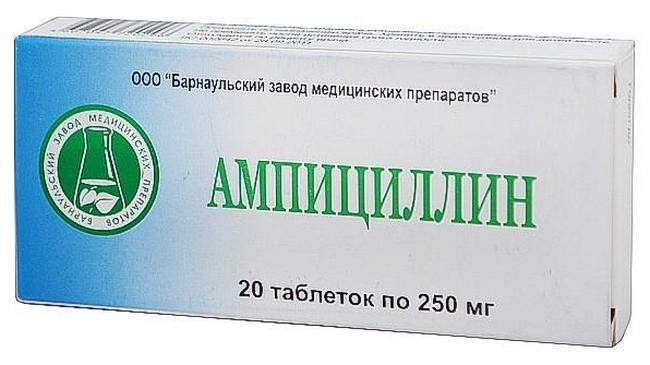
Ampicillin is prescribed from 1000 to 2000 mg per day for 5 to 10 days. Combine taking an antibiotic with a probiotic. Hilak Forte is suitable for nursing mothers. The baby is prescribed a probiotic when signs of gastrointestinal distress appear, as prescribed by the doctor.
We recommend reading: Breast care before and after breastfeeding
#4 Probiotics can be beneficial
Most healthy people tolerate a course of antibiotic therapy well. The intestinal flora, as a rule, is quickly restored. One common side effect of antibiotic use is diarrhea. This is partly due to the fact that antibiotics kill not only unwanted harmful bacteria, but also beneficial ones.
Theoretically, the use of probiotics should restore the balance of intestinal flora, but there is insufficient evidence for this.
Research shows that some probiotics may help prevent diarrhea caused by infections or antibiotics [3].
This relates to the potential use of probiotics in mothers taking antibiotics.
Antibiotics allowed during lactation
In fact, everything is not so hopeless, since there are antibiotics that are allowed during lactation and have minimal side effects. That is why, when contacting a doctor, you should tell him about your function as a nursing mother. This precaution is very important, because there are safe drugs and treatment regimens for the lactation period. Therefore, you should not trust the advice of a friend or dubious Internet recommendations and self-medicate. Only a qualified specialist will be able to select an effective antibiotic that is as harmless as possible for the child and recommend a gentle dosage.
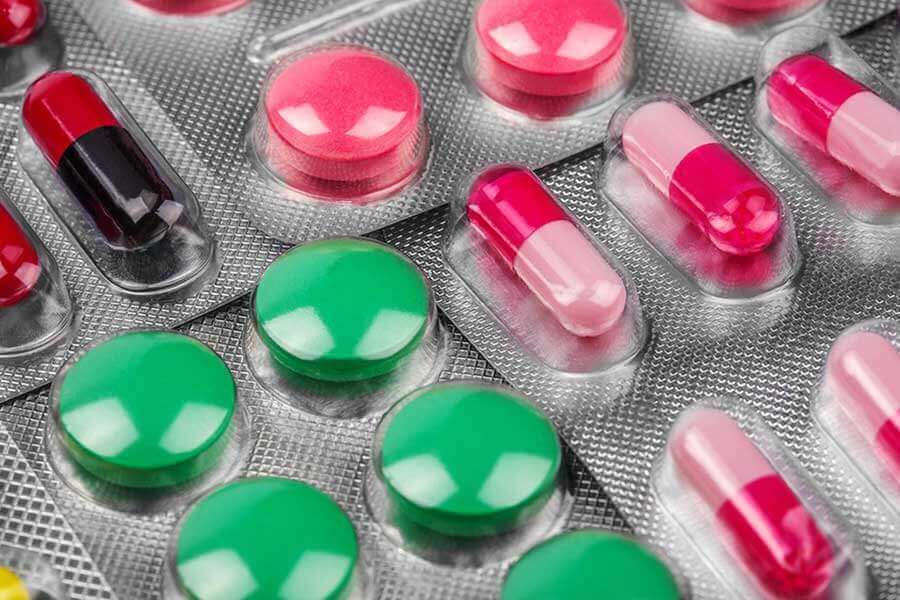
No. 6 Approved antibiotics
| Active substance: | Trade names: | Application for hepatitis B: |
| Amoxicillin | Flemoxin Solutab Amoxicillin Amoxicillin Sandoz | Allowed |
| Ampicillin | Ampicillin | Allowed |
| Benzathine benzylpenicillin | Bicillin-1 Extensillin Retarpen | Allowed |
| Benzylpenicillin | Benzylpenicillin Penicillin G Procaine | Allowed |
| Cloxacillin | Cloxacillin | Allowed |
| Phenoxymethylpenicillin | Ospen Phenoxymethylpenicillin | Allowed |
| Amoxicillin + Clavulanic acid | Amoxiclav Augmentin Flemoklav Solutab Ecoclave Panclave | Allowed |
| Ceftazidime | Fortum Ceftazidime Ceftidine Vicef | Allowed |
| Ceftriaxone | Ceftriaxone Rocefin Azaran Lendatsin Forcef | Allowed |
| Erythromycin | Erythromycin Ilozon Ermiced | Allowed |
| Nitrofurantoin | Furadonin | Compatible with breastfeeding for healthy newborns. Avoid if baby is premature or less than 1 month old. Possible side effects (hemolysis and jaundice). Avoid in children with G-6-PD enzyme deficiency. |
| Co-trimoxazole (Sulfamethoxazole + Trimethoprim) | Biseptol Bactrim Co-trimoxazole Septrin Sumetrolim Trimezol | Compatible with breastfeeding for healthy newborns. Avoid if baby is premature or less than 1 month old. Possible side effects (hemolysis and jaundice). Avoid in children with G-6-PD enzyme deficiency. |
| Dapsone | Dapsone | Allowed. Monitor for side effects (hemolysis and jaundice), especially if the infant is premature or less than 1 month old. Avoid in children with G-6-PD enzyme deficiency. |
| Rifampicin | Rifampicin | Allowed. Monitor your baby for symptoms of jaundice. |
| Ethambutol | Combutol Ethambutol Ecox | Allowed. |
| Isoniazid | Isoniazid | Allowed. Monitor your baby for symptoms of jaundice. |
| Isoniazid + Ethambutol | Phthisoetam Protubetam | Allowed. Monitor your baby for symptoms of jaundice. |
| Pyrazinamide | Pyrazinamide Pisina | Allowed. Monitor your baby for symptoms of jaundice. |
| Streptomycin | Streptomycin | Allowed. Monitor your baby for symptoms of jaundice and diarrhea. |
Rules for taking antibiotics.
- Monitor your child's reaction to your antibiotics. If loose stools, vomiting, rashes on the skin and mucous membranes appear, consult a doctor to adjust treatment.
- Strictly follow the grams of the drug - reducing the dose will only harm you, and the medicine will still get into the milk.
- Try to drink the antibiotic immediately after feeding - this will give you some time before the next one so that the concentration of the substance in the blood decreases.
- Take the tablet with plenty of water - this will dissolve it better and start working faster.
- If you are taking a group of drugs and interrupting breastfeeding, pay attention to the time it takes for the antibiotic to be removed from the body - for some it takes 1-2 days, for others it will take 6-7 days! Don't stop pumping and drink more clean water.
Attention: the article is for informational purposes only. For all questions, always consult only a specialist; do not trust the opinions of readers of forums on the Internet.
No. 7 Prohibited antibiotics and those for which there is no data
| Active substance: | Trade names: | Application for hepatitis B: |
| Clindamycin | Dermazin SULFARGIN | Not allowed. The child may have diarrhea or bloody stools. |
| Vancomycin | Edicin Vancomycin Vero-Vancomycin Vancocin | No data |
| Spectinomycin | Trobitsin Kirin | No data |
| Sulfadiazine | Dermazin SULFARGIN | Avoid if possible, especially if baby is premature or less than 1 month old. Possible side effects (hemolysis and jaundice). Avoid in children with G-6-PD enzyme deficiency. |
| Metronidazole | Metronidazole Metrogyl Klion Flagyl Trichopolum | Avoid if possible. Animal studies suggest it may be carcinogenic. If 2 grams is given as a single dose, stop breastfeeding for 12 hours. Express breast milk in advance and store it in the refrigerator so that your baby can eat it at this time. |
| Nalidixic acid | Nevigramon Negro | Avoid if possible, especially if baby is premature or less than 1 month old. Possible side effects (hemolysis and jaundice). Avoid in children with G-6-PD enzyme deficiency. |
| Imipenem + Cilastatin | Tienam Tsilapenem Aquapenem Tiepenem | No data |
| Chloramphenicol | Levomycetin Chloramphenicol Levovinisole | Avoid if possible, especially if infant is less than 1 month old. Monitor the child for side effects (hemolysis and jaundice). |
| Ciprofloxacin | Ciprofloxacin Tsifran Tsiprinol Tsiprolet Tsiprobay | Avoid taking it if possible. It is better to interrupt the GW. |
| Doxycycline | Unidox Solutab Doxycycline Doxylan Vibramycin | Avoid if possible. Possibility of staining baby's teeth. A single dose is probably safe. |
How to take antibiotics correctly?
- Do not self-medicate, take only those medications that are prescribed by a doctor and can neutralize the microorganisms that cause the disease. An incorrectly selected medicine will not only harm the child, but will also not provide a therapeutic effect.
- Monitor the baby's condition while taking antibiotics. If he has side effects in the form of diarrhea , vomiting or rash , it is necessary to consult a doctor to adjust the therapy.
- Do not exceed or reduce the dosage prescribed by a specialist. Increasing the dose may harm the child; decreasing it will reduce the effectiveness of therapy and ultimately prolong the treatment period.
- Take an antibacterial drug during or immediately after feeding. Thus, by the time of the next feeding, the concentration of harmful substances in the milk will drop. If an antibiotic is prescribed once a day, it is better to take it after the evening feeding. If twice a day: take the first before bedtime , and the second 12 hours later, before bedtime.
- Take tablets and capsules with plenty of water. This will speed up the dissolution of the drug and its entry into the bloodstream.
- Before starting treatment, you should contact your pediatrician so that he can prescribe maintenance medications for your baby.
If the baby was born premature or less than a week old, even approved antibiotics are taken with great caution.
All information about the drug is contained in the instructions attached to it. It should be studied even if the doctor has already prescribed treatment. If you have any doubts about contraindications, you can seek advice from a breastfeeding specialist. By taking approved antibiotics according to the regimen prescribed by a specialist, you can avoid the development of side effects in both mother and child.
Advertisement
Attention! The use of any medications and dietary supplements, as well as the use of any therapeutic methods, is possible only with the permission of a doctor.
No. 8 How long after can you breastfeed: when to start?
If the mother takes antibiotics from the approved section, then there is no need to interrupt breastfeeding. Replacing breast milk with formula will be more harmful for the baby.
If there is a need to take antibiotics prohibited during lactation, the doctor recommends that the woman stop breastfeeding. If you use the drug once, you need to express milk before taking it, put it in the refrigerator and feed it to your baby for 12 hours. During this time, breast milk should be expressed and discarded.
When is taking antibiotics necessary?
The need for a nursing mother to take antibacterial agents may arise during serious inflammatory processes.
The reason for this is the penetration into the body of bacteria of the staphylococcal, streptococcal groups and other microorganisms, whose reproduction cannot be stopped with lighter drugs.

Nursing mothers must agree with the doctor’s prescriptions for the following indications:
- infection of the birth canal that occurred due to complicated labor;
- severe inflammatory diseases of the respiratory system (for example, pneumonia), ENT organs (tonsillitis);
- infectious intestinal diseases (salmonellosis, typhoid fever);
- urinary tract infections, severe kidney damage.
For such diseases, taking antibiotics will provide nursing women with a speedy recovery and improved well-being. However, these drugs also affect the child, passing through milk. That is why the main criterion when choosing them during lactation is harmlessness to the newborn.
Always tell your doctor that you are a nursing mother.
Some effective antibiotics are strictly prohibited during lactation due to the pronounced negative effects on the child’s body. The doctor will be able to select gentle and approved means.
Features of breastfeeding a child during mother's illness
Nature has taken care to make the lactation process in the female body as reliable and stable as possible. Milk production continues continuously even if a woman has serious illnesses. Naturally, there are also contraindications, according to which a young mother needs to give up natural feeding of her child. For example: The World Health Organization prohibits breastfeeding for women suffering from diseases such as heart failure, kidney, lung and liver diseases.
However, if we talk about the cold virus, then in this case it is not worth interrupting the feeding of the child, for the reason that protective antibodies against the pathogenic agent have already begun to enter his body. The mother may not yet show the first symptoms of the disease, but antibodies are already reaching her baby through breast milk. That is why, if feeding is interrupted, the child will no longer receive immune protection and will be forced to independently resist the virus.
- USEFUL TO KNOW WHEN TAKING ANTIBIOTICS: refusal to express milk can lead to stagnation of fluid in the mammary glands, which provokes the development of mastitis. Over time, the situation will worsen and cause serious complications. Many mothers refuse to breastfeed their baby at elevated temperatures also because they fear it will curdle, go rancid or sour, which is not true. Moreover, if you are sick, you should not try to boil breast milk - this process will completely destroy almost all the protective properties and beneficial substances in it.





